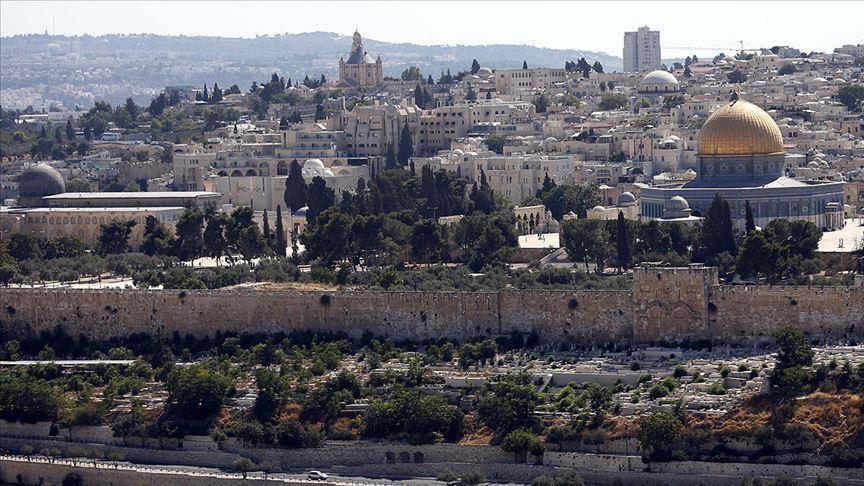Israeli excavations threaten Al-Aqsa Mosque: Experts
Israel refuses to allow access to UNESCO to examine holy sites in East Jerusalem

JERUSALEM
Israeli excavations in Jerusalem are posing an imminent threat to the flashpoint Al-Aqsa Mosque compound and residents of the holy city, Palestinian experts have warned.
"The Israel excavations beneath the Al-Aqsa Mosque compound have been in full swing in the past 60 years," archaeology professor Jamal Amro told Anadolu Agency.
"The diggings, however, have gone under the foundations of the compound in the past 15 years," he said.
Israel occupied East Jerusalem, where the flashpoint Al-Aqsa Mosque compound is located, during the 1967 Arab-Israeli War.
In a move never recognized by the international community, Israel annexed the entire city in 1980, claiming it the self-proclaimed Jewish state’s “eternal and undivided” capital.
“Since 1967, Israel has carried out more than 100 excavations under the ancient city allegedly for rainwater drainage," Amro added.
He said Israel is currently carrying out 22 diggings in Jerusalem, four of which are going under Al-Buraq (western) wall and five under the Silwan neighborhood.
According to Amro, the depth of the Israeli excavations in this area reaches more than 20 meters underground.
Late in June, Israeli officials opened a tunnel under the Silwan neighborhood in East Jerusalem, with the attendance of U.S. Ambassador to Israel David Friedman and Middle East envoy Jason Greenblatt.
For Muslims, Al-Aqsa represents the world's third holiest site after Makkah and Medina. Jews refer to the area as the "Temple Mount", claiming it was the site of two Jewish temples in ancient times.
Cracks
Amro said the Israeli excavations have caused cracks in the chapel of women, and the building of the Awqaf department and the southern and western walls of Al-Aqsa compound as well as the walls of Al-Ashrafieh school, located inside the holy compound.
Ahmad Siam, the owner of a house in Silwan, said he can hear the excavations beneath his house.
"The house walls began to crack from inside and outside due to the Israeli diggings," Siam told Anadolu Agency.
"The excavations are between 12-14 meters underground, which threatens the foundations of my house and other houses in the neighborhood."
According to Siam, Palestinian families in Wadi Hilweh neighborhood had to close parts of their houses due to fears of collapse.
"They fear that their homes may collapse on their heads," he said.
In March, heavy rains had caused ground cracks due to Israeli excavations in the area.
In July 2017, UN cultural agency UNESCO adopted a resolution that denounced Israel's failure to "cease the persistent excavations, tunneling, works, projects and other illegal practices in East Jerusalem, particularly in and around the Old City of Jerusalem, which are illegal under international law".
The resolution further stated that "legislative and administrative measures and actions taken by Israel, the occupying power, which have altered -- or purport to alter -- the character and status of the holy city of Jerusalem… are null and void and must be rescinded forthwith".
Israel, for its part, refuses to allow access to UNESCO to examine the holy sites in East Jerusalem.
Jewish narrative
Hanna Issa, the head of the High Islamic-Christian Committee in Jerusalem, warned that Israel wants to change the history of Jerusalem to conform with the Jewish narrative.
"Israel is building another city under Jerusalem, so they can tell the Palestinians in any future deal that what above-ground will be divided and what is underground is only for Jews," he told Anadolu Agency.
He warned that the Israeli government wants to completely change all the features of Jerusalem, and abolish any feature of the Arab and Islamic history "to give the city a new identity consistent with the Jewish narrative".
“The most dangerous tools are the tunnels that are undermining the foundations of the old town and surrounding the Haram al-Sharif (Aqsa Mosque)," he said.
Jerusalem remains at the heart of the decades-long Middle East dispute, with Palestinians hoping that East Jerusalem might one day serve as the capital of a Palestinian state.








